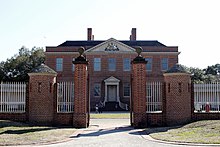The North Carolina General Assembly of 1777 met in two sessions in New Bern, North Carolina, from April 7 to May 9, 1777, and from November 15 to December 24, 1777. This was the first North Carolina legislature elected after the last provincial congress wrote the first North Carolina Constitution. This assembly elected Richard Caswell as the state's first constitutional governor (he had been serving as acting governor by action of the provincial congress).[1][2][3][4][5][6]
| 1st North Carolina General Assembly (1777) | |||||
|---|---|---|---|---|---|
| |||||

Tryon Palace recreated in the 1950s, seized by the patriots and used as the first seat of government
| |||||
| Overview | |||||
| Legislative body | North Carolina General Assembly | ||||
| Jurisdiction | North Carolina, United States | ||||
| Meeting place | New Bern, North Carolina | ||||
| Term | 1777 | ||||
| North Carolina Senate | |||||
| Members | 39 Senators (38 counties, one district) | ||||
| Speaker | Samuel Ashe | ||||
| Clerk | James Green, Jr. | ||||
| North Carolina House of Commons | |||||
| Members | 76 Representatives from 38 counties, 6 from districts | ||||
| Speaker | Abner Nash | ||||
| Clerk | Benjamin Exum | ||||
| Sessions | |||||
| |||||
Each of the 38 counties of North Carolina were authorized to elect one senator and two representatives to the House of Commons. In addition, six boroughs (also called districts) elected one House member each. An additional district, Washington District, had one senator and no representative in the House of Commons. Washington District comprised the lands that later became part of Tennessee in 1789. It was referred to as a District in 1776 and 1777 and Washington County after 1777.[1][2]
The North Carolina Constitution of 1776 created a strong legislature and a weak executive. The constitution created a bicameral legislature consisting of a Senate made up of one representative from each county and a House of Commons with two members from each county and one member from each of seven designated districts, including Washington District. House members had to own at least 100 acres of land and Senate members had to own at least 300 acres of land. Members were not paid for their services. The governor was chosen annually. Thus, Richard Caswell was chosen the first governor of the State of North Carolina. The governor had no veto power and little control over patronage, He could not convene, prorogue, or dissolve the legislature.[7]
Members of the legislature were elected by popular vote annually. As such, they were the only state officials elected by popular vote. The constitution allowed that "all freemen of the age of twenty-one years, who have been inhabitants of any one county within this State twelve months immediately preceding the day of any election, and shall have paid public taxes shall be entitled to vote for members of the House of Commons for the county in which he resides". It also allowed "that all freemen, of the age of twenty-one years, who have been inhabitants of any one county within the State twelve months immediately preceding the day of any election and possessed of a freehold within the same county of fifty acres of land for six months next before, and at the day of election, shall be entitled to vote for a member of the Senate." Restrictions were placed on voting for town or district members, i.e. "That all persons possessed of a freehold in any town in this State, having a right of representation and also all freemen who have been inhabitants of any such town twelve mouths next before and at the day of election, and shall have paid public taxes, shall be entitled to vote for a member to represent such town in the House of Commons: -- Provided always, That this section shall not entitle any inhabitant of such town to vote for members of the House of Commons, for the county in which he may reside, nor any freeholder in such county, who resides without or beyond the limits of such town, to vote for a member for said town.[7][8]
The Constitution of 1776 required the General Assembly to "appoint judges of the Supreme Courts of Law and Equity, Judges of Admiralty, and Attorney-General," who were commissioned by the Governor and held office during good behavior. Acting under this authority, the General Assembly in 1776 divided the State into six judicial districts. Under the act of 1777 three judges, Samuel Ashe, Samuel Spencer, and James Iredell, were chosen.[1][8]
The General Assembly of 1777 was also responsible for electing Councilors of State. They elected the following councilors on April 18, 1777:[1]
The General Assembly of 1777 elected James Glasgow from Dobbs County as North Carolina Secretary of State.[1][9]
From 1777 to 1779, the State was divided into two districts, Northern and Southern, each with a treasurer. John Ashe from New Hannover County was elected treasurer of the Southern District. Samuel Johnston from Chowan County was elected treasurer of the Northern District but declined to serve, so William Skinner was elected.[1]
Waightstill Avery from Burke County was elected Attorney-General by the 1777 legislature.[1]
The General Assembly of 1777 elected the following Judges of the Superior Court: James Iredell (1777–1778, Samuel Ashe (1777–1795), and Samuel Spencer (1777–1794).[1]
The constitution gave the Senate and House of Commons the power to appoint the generals and field-officers of the militia, and all officers of the regular army of this State.[8]
The following counties were created in 1777 by the legislature: Burke, Camden, Caswell, Nash, and Wilkes counties.[1]
The following acts were passed by the General Assembly of 1777 during the first session:[10][note 2]
During the second session, the following acts were approved:[10]
The following list shows the names of the house members and the counties or districts that they represented[3][1][2][12]
The following Senators served in this assembly:[15][4][1][2]
General notes:
House notes:
Senate notes:
{{cite book}}: |website= ignored (help)